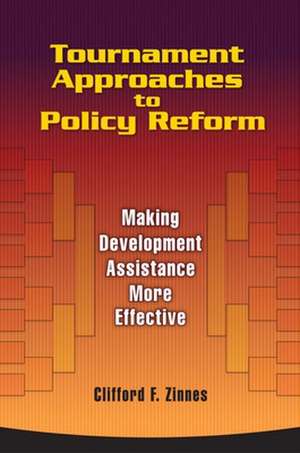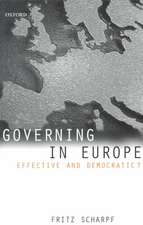Tournament Approaches to Policy Reform: Making Development Assistance More Effective
Autor Clifford F. Zinnesen Limba Engleză Paperback – 10 iun 2009
While much foreign aid achieves commendable goals, some is ineffective. In this volume, Clifford Zinnes argues that a donor's intrinsic informational limitations on the local context as well as inability to control the progress of interventions mean that lack of success is not rooting in insufficient funding but in maladapted institution designs of interventions that don't foster local ownership. He indentifies and assesses a newly emerging class of foreign aid delivery that promises to overcome these obstacles. The approach is based on "prospective inter-jurisdictional competition" (PIJC). Beneficiary groups—often local-level governments, supported by their private sector and civil society—act as teams and compete against each other under explicit predefined rules and objectives to design and implement interventions under their own aegis to achieve the highest quantitatively measured performance, either relative to others ("tournaments") or against a preset benchmark ("certification"). Teams that cooperate internally are the likeliest to win the rewards, which, aside from the longer run benefits of the intervention itself, might include more substantive financial or technical assitance from the sponsor.
Since only groups serious about reforming choose to play, Zinnes says the incentives generated by the ensuing "race-to-the-top" competitiion create local ownership, encouraging recipients to draw on their own knowledge. Moreover, since all teams that compete—and not just those who "win" donor rewards—benefit from their own reform efforts, he argues that this approach can leverage aid resources more than a conventional bilateral aid agreement. Zinnes presents a dozen recent applications of the approach, including those sponsored by the World Bank, USAID, the United Nations, the Ford Foundation, and others. He also recommends improvements and ways to scale up PIJC-based projects in applications ranging from protecting the environment and reducing red tape through to raising literacy and co-opting warlords.
Since only groups serious about reforming choose to play, Zinnes says the incentives generated by the ensuing "race-to-the-top" competitiion create local ownership, encouraging recipients to draw on their own knowledge. Moreover, since all teams that compete—and not just those who "win" donor rewards—benefit from their own reform efforts, he argues that this approach can leverage aid resources more than a conventional bilateral aid agreement. Zinnes presents a dozen recent applications of the approach, including those sponsored by the World Bank, USAID, the United Nations, the Ford Foundation, and others. He also recommends improvements and ways to scale up PIJC-based projects in applications ranging from protecting the environment and reducing red tape through to raising literacy and co-opting warlords.
Preț: 267.57 lei
Nou
Puncte Express: 401
Preț estimativ în valută:
51.20€ • 54.75$ • 42.69£
51.20€ • 54.75$ • 42.69£
Carte tipărită la comandă
Livrare economică 17 aprilie-01 mai
Preluare comenzi: 021 569.72.76
Specificații
ISBN-13: 9780815797197
ISBN-10: 0815797192
Pagini: 369
Dimensiuni: 152 x 229 x 28 mm
Greutate: 0.57 kg
Editura: Brookings Institution Press
Colecția Brookings Institution Press
ISBN-10: 0815797192
Pagini: 369
Dimensiuni: 152 x 229 x 28 mm
Greutate: 0.57 kg
Editura: Brookings Institution Press
Colecția Brookings Institution Press
Notă biografică
Clifford F. Zinnes is a senior fellow at the IRIS Center in the Economics Department and a faculty affliliate at the Maryland School of Public Policy, both at the University of Maryland. Focusing on aid effectiveness, as a practitioner of the "new" institutional economics, Zinnes also writes on the shadow economy, environmental protection, and failing and fragile states. While at Harvard University for more than a decade, he taught and conducted field work in a dozen countries, including Romania, where he coauthored several laws related to privatization, water management, and environmental protection.
Descriere
While much foreign aid achieves commendable goals, some is ineffective. In this volume, Clifford Zinnes argues that a donor's intrinsic informational limitations on the local context as well as inability to control the progress of interventions mean that lack of success is not rooting in insufficient funding but in maladapted institution designs of interventions that don't foster local ownership. He indentifies and assesses a newly emerging class of foreign aid delivery that promises to overcome these obstacles. The approach is based on "prospective inter-jurisdictional competition" (PIJC). Beneficiary groups—often local-level governments, supported by their private sector and civil society—act as teams and compete against each other under explicit predefined rules and objectives to design and implement interventions under their own aegis to achieve the highest quantitatively measured performance, either relative to others ("tournaments") or against a preset benchmark ("certification"). Teams that cooperate internally are the likeliest to win the rewards, which, aside from the longer run benefits of the intervention itself, might include more substantive financial or technical assitance from the sponsor.
Since only groups serious about reforming choose to play, Zinnes says the incentives generated by the ensuing "race-to-the-top" competitiion create local ownership, encouraging recipients to draw on their own knowledge. Moreover, since all teams that compete—and not just those who "win" donor rewards—benefit from their own reform efforts, he argues that this approach can leverage aid resources more than a conventional bilateral aid agreement. Zinnes presents a dozen recent applications of the approach, including those sponsored by the World Bank, USAID, the United Nations, the Ford Foundation, and others. He also recommends improvements and ways to scale up PIJC-based projects in applications ranging from protecting the environment and reducing red tap
Since only groups serious about reforming choose to play, Zinnes says the incentives generated by the ensuing "race-to-the-top" competitiion create local ownership, encouraging recipients to draw on their own knowledge. Moreover, since all teams that compete—and not just those who "win" donor rewards—benefit from their own reform efforts, he argues that this approach can leverage aid resources more than a conventional bilateral aid agreement. Zinnes presents a dozen recent applications of the approach, including those sponsored by the World Bank, USAID, the United Nations, the Ford Foundation, and others. He also recommends improvements and ways to scale up PIJC-based projects in applications ranging from protecting the environment and reducing red tap
















